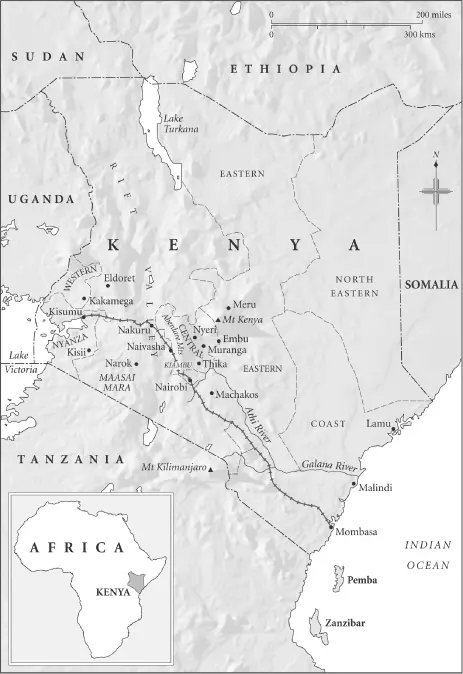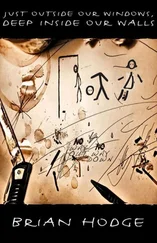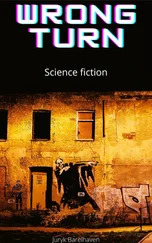MICHELA WRONG
It's Our Turn to Eat
The Story of a Kenyan Whistleblower

Fourth Estate
An imprint of HarperCollins Publishers Ltd. 1 London Bridge Street London SE1 9GF
www.harpercollins.co.uk
First published in Great Britain in 2009
Copyright © Michela Wrong 2009
Michela Wrong asserts the moral right to be identified as the author of this work
A catalogue record for this book is available from the British Library
All rights reserved under International and Pan-American Copyright Conventions. By payment of the required fees, you have been granted the non-exclusive, non-transferable right to access and read the text of this ebook on-screen. No part of this text may be reproduced, transmitted, down-loaded, decompiled, reverse engineered, or stored in or introduced into any information storage and retrieval system, in any form or by any means, whether electronic or mechanical, now known or hereinafter invented, without the express written permission of HarperCollins ebooks
HarperCollins Publishers has made every reasonable effort to ensure that any picture content or written content in this ebook has been included or removed in accordance with the contractual or technological constraints in operation at the time of publication
Source ISBN: 9780007241965
Ebook Edition © 2009 ISBN: 9780007325115
Version: 2017-08-22
‘We lived many lives in those whirling campaigns, never sparing ourselves: yet when we achieved and the new world dawned, the old men came out again and took our victory to re-make in the likeness of the former world they knew. Youth could win, but had not learned to keep: and was pitiably weak against age. We stammered that we had worked for a new heaven and a new earth, and they thanked us kindly and made their peace.’
T.E. LAWRENCE, Seven Pillars of Wisdom
Cover
Title Page
Copyright
Epigraph
Map
Prologue
Chapter 1 - The Big Man
Chapter 2 - An Unexpected Guest
Chapter 3 - Starting Afresh
Chapter 4 - Mucking out the Augean Stables
Chapter 5 - Dazzled by the Light
Chapter 6 - Pulling the Serpent's Tail
Chapter 7 - The Call of the Tribe
Chapter 8 - Breaking the Mould
Chapter 9 - The Making of the Sheng Generation
Chapter 10 - Everything Depends on the Boss
Chapter 11 - Gorging Their Fill
Chapter 12 - A Form of Mourning
Chapter 13 - In Exile
Chapter 14 - Spilling the Beans
Chapter 15 - Backlash
Chapter 16 - A Plaza Paradise
Chapter 17 - It's Not Your Turn
Epilogue
Keep Reading
Notes
Glossary
Index
Acknowledgements
Ebook Extra
About the Author
By the Same Author
About the Publisher

It was early evening, that time when the traffic jams that clog the Kenyan capital of Nairobi's arteries for most of the working day reach their apogee.
Down below, thousands of honking matatu minibuses, drivers hyped on adrenalin and pent-up frustration, were doing their best to get their passengers home. Fighting for space against the lumbering public buses, sagging like old mattresses under the weight of their clientele, the customised Toyotas and Nissans jerked in fits and starts across the crumbling roundabouts, their touts leaning out of half-open doors to wheedle and abuse, pounding on the bonnets of encroaching cars in a manner more bullying than friendly. Choking on the black fumes pumped from hundreds of over-revved, under-serviced engines, blue-uniformed policemen struggled to keep the flow moving.
On the fifteenth floor of the Ministry of Finance, however, the beeps and angry shouts were barely audible. Most of the messengers, clerks and secretaries, keepers of the ubiquitous departmental Thermos of tea, had abandoned their perches behind the varnished wooden partitions, silence was creeping in to take their place. From this elevation, the world below seemed calm and peaceful, lent tranquillity by the approaching chill of evening. Wheeling in cooling eddies of warm air, kites traced monotonous circles high above, like black smuts whirling over a dying fire. Even higher above them gracefully looped Nairobi's sinister valkyries, the marabou storks, hardworking scavengers of the nearby slums.
From up here, the historic landmarks of the city centre, so grubby at street level, looked almost pristine. One side of the ministry gazed south-east, across the rusting, dilapidated entrails of the giant railway depot that was both the city and the country's original raison d'être : for Nairobi was the spot where British railroad engineers paused to gather their material, manpower and energies before flinging their ironware up and over the escarpment and dizzily down into the Rift Valley, aiming at the giant lake lying at the continent's alluring heart.
Beyond stretched the hangars and godowns of the Industrial Area, the capital's main airport and the savannah expanse of Nairobi's game park, hemmed in by the dry Ukambani hills, where the odd feather of grey smoke – some peasant clearing land – plumed skyward. The other side of the ministry looked across Harambee Avenue, past the colonnaded Law Courts, towards the clock tower of Parliament Buildings, City Hall and the conference complex named after Jomo Kenyatta, once dubbed a ‘leader unto darkness and death’ by a British official, now honoured as the nation's founding father. The small dots moving about on the esplanade below were Kenyan sightseers, come to have their pictures taken in front of the late president's seated statue, which showed him in chieftain's cap, flywhisk in hand. Beyond the square one could glimpse the lawns of Uhuru Park, where Mwai Kibaki, Kenyatta's former finance minister, had been inaugurated president eighteen months earlier. From up here, the park seemed the green and pleasant public garden its planners had originally envisaged, rather than what it had become in the intervening years: open-air toilet, haunt of roaming muggers, resting spot for the homeless and exhausted.
Inside the minister's office, three men sat locked in intimate conversation: the finance minister himself, a pudgy septuagenarian with a spray of whitening hair; the justice minister, a former human rights campaigner with an acne-scarred complexion and a woman's pulpy lips; and a third player, a barrel-chested, trunk-necked lumberjack of a man who looked ready to burst from his suit at any moment. What the three were discussing was so engrossing, they were barely aware of their surroundings.
And then it happened. The giant suddenly became aware of a metallic whispering … What was that? His stomach lurched as he realised that tinny, tiny sound was coming from his own midriff. He could barely believe it. The recorder he had taped to his stomach, its wire lead and microphone stuck to his breastbone, had somehow switched into ‘play’ mode. The voices of the two men before him were now being relayed back, potentially exposing him as what he was: spy, sneak, mole.
He coughed loudly, spluttered, coughed again, hoping to drown out the noise. In a booming voice – his voice always boomed, they would find nothing strange in that – he excused himself, lurched out of the ministerial office, and headed swiftly down the gloomy corridor, aiming for the gents'. Inside the cubicle, hands trembling with adrenalin, he adjusted the device. How on earth had that happened? He was tempted for a moment to abandon this particular attempt. Perhaps Fate was telling him not to push his luck any further. But no, might as well be consistent. He had already crossed the line, transgressed in ways that most of his fellow countrymen would have never dreamed possible and many would never forgive. Might as well see the thing through. Routine was important, it lent shape and definition. He put the device back into ‘record’ mode, carefully adjusted his shirt. He splashed some cold water on his face, took a few deep breaths, and walked back into the office.
Читать дальше














